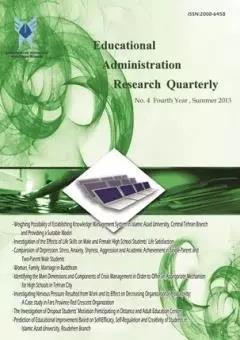Explaining the ambiguity tolerance model by managers according to individual and organizational variables in the elementary schools of Najaf Ashraf, Iraq
Subject Areas : Educational managementNasir Jodi 1 , Mohammad Naghi Imani 2 , Maryam Hashem 3 , اصغر شریفی 4 , Mohammad Ali Nadi 5
1 - Doctoral student specializing in Educational Management, Department of Educational Sciences, Isfahan (Khorasgan) Branch, Islamic Azad University, Isfahan, Iran.
2 - Faculty member and Assistant Professor of Islamic Azad University, Roudhen Branch
3 - Assistant Professor, Department of Educational Sciences, Wasit, Iraq.
4 - استادیار/دانشگاه آزاد اسلامی
5 - Full Professor, Department of Educational Sciences, Isfahan (Khorasgan) Branch, Islamic Azad University, Isfahan, Iran
Keywords: ambiguity tolerance, school managers, organizational variables, individual variables,
Abstract :
This research has been done with the aim of explaining the ambiguity tolerance model by the managers with regard to individual and organizational variables in the elementary schools of Najaf Ashraf, Iraq. The research method is applied in terms of purpose, descriptive-survey in terms of data collection method, and qualitative in terms of data type. The statistical population included all principals of elementary schools in Najaf Ashraf province of Iraq and academic specialists and professors, among whom 15 people were selected purposefully and according to the principle of theoretical saturation as a sample. The research tool was a semi-structured interview. By analyzing the content of the interviews and extracting the codes, individual and organizational dimensions and components affecting the tolerance of ambiguity by school administrators were identified. The coding process has been done using MAXQDA software version 2020. The findings showed that at the end of the open coding process, 35 concepts were identified and labeled. At the end of this stage of coding, the initial concepts were examined, analyzed and categorized to extract sub-categories. Based on this, in axial coding, 10 categories were identified and classified, so that with their help, the model of tolerance of ambiguity on the part of managers can be explained with regard to individual and organizational variables in the elementary schools of Najaf, Ashraf, Iraq. This model has two categories of variables. Individual dimension with 5 variables and organizational dimension with 5 variables
دبیری ترانه، کاکاوند علیرضا، کشاورز سمیه. مقایسه ویژگیهای شخصیتی، قدرت تحمل ابهام و امید به زندگی افراد راضی و ناراضی از تزریق واکسن کرونا. مجله علمی پژوهشی سازمان نظام پزشکی جمهوری اسلامی ایران. ۱۴۰۲; ۴۱ (۴) :۴۶-۵۳
کاظم زاده, محمد, اسدزاده, حسن, معاضدیان, آمنه, کرمی, ابوالفضل. (1400). الگوی ساختاری رضایت از زندگی بر اساس نظمجویی هیجانی، مهارت حل ﻣﺴئله و تحمل ابهام با میانجیگری ویژگی های شخصیتی زوجین. خانواده درمانی کاربردی, 2(3), 1-24. doi: 10.22034/aftj.2021.136424
مرادی مرتضی، زندی پاک رابعه. رهبری اخلاقی و خستگی هیجانی: نگاهی به ویژگی های شخصیتی. اخلاق در علوم و فناوری. ۱۴۰۰; ۱۶ (۳) :۱۶۸-۱۷۲
Ansell, C., & Boin, A. (2019). Taming deep uncertainty: The potential of pragmatist principles for understanding and improving strategic crisis management. Administration & Society, 51(7), 1079-1112.
Beauchamp, G., Hulme, M., Clarke, L., Hamilton, L., & Harvey, J. A. (2021). ‘People miss people’: A study of school leadership and management in the four nations of the United Kingdom in the early stage of the COVID-19 pandemic. Educational Management Administration & Leadership, 49(3), 375-392.
Borst, P., Benjamin, J., Wielinga, B., & Akkermans, H. (1996, August). An application of ontology construction. In Workshop on ontological engineering, ECAI (Vol. 96, pp. 5-16).
Caligiuri, P., & Tarique, I. (2012). Dynamic cross-cultural competencies and global leadership effectiveness. Journal of world Business, 47(4), 612-622.
Ham, S. H., Kim, J., & Lee, S. (2020). Which schools are in greater need of culturally responsive leaders? A pedagogical uncertainty management perspective. Multicultural Education Review, 12(4), 250-266.
Han, K. (2021). Students’ well-being: the mediating roles of grit and school connectedness. Frontiers in psychology, 12, 787861.
Jach, H. K., & Smillie, L. D. (2019). To fear or fly to the unknown: Tolerance for ambiguity and Big Five personality traits. Journal of Research in Personality, 79, 67-78.
K. Katsaros, K., N. Tsirikas, A., & S. Nicolaidis, C. (2014). Managers' workplace attitudes, tolerance of ambiguity and firm performance: The case of Greek banking industry. Management Research Review, 37(5), 442-465.
Katsaros, K. K., & Nicolaidis, C. S. (2012). Personal traits, emotions, and attitudes in the workplace: Their effect on managers' tolerance of ambiguity. The Psychologist-Manager Journal, 15(1), 37-55.
Lauriola, M., Foschi, R., Mosca, O., & Weller, J. (2016). Attitude toward ambiguity: Empirically robust factors in self-report personality scales. Assessment, 23(3), 353-373.
Lazarus, M. D., Gouda‐Vossos, A., Ziebell, A., & Brand, G. (2023). Fostering uncertainty tolerance in anatomy education: Lessons learned from how humanities, arts and social science (HASS) educators develop learners' uncertainty tolerance. Anatomical Sciences Education, 16(1), 128-147.
Marshall, J., Roache, D., & Moody-Marshall, R. (2020). Crisis leadership: A critical examination of educational leadership in higher education in the midst of the COVID-19 pandemic. International Studies in Educational Administration, 48(3), 30-37.
Mudjisusatyo, Y. (2023). Dominant Factors Influencing the Performance of Principals of Vocational High Schools in Indonesia. International Journal of Education in Mathematics, Science and Technology, 11(5), 1238-1257.
O'Connor, P., Becker, K., & Bell, S. (2017). Embracing ambiguity in the workplace: A new measure of tolerance of ambiguity.
Pashiardis, P., & Brauckmann-Sajkiewicz, S. (2022). Unravelling the business of educational leaders in times of uncertainty. Educational Management Administration & Leadership, 50(2), 307-324.
Rayner, S. M. (2018). Leaders and leadership in a climate of uncertainty: A case study of structural change in England. Educational Management Administration & Leadership, 46(5), 749-763.
Sutherland, I. E. (2017). Learning and growing: Trust, leadership, and response to crisis. Journal of Educational Administration, 55(1), 2-17.
Tabancalı, E., & Su, Y. (2021). Role ambiguity of school principals. Eğitimde Nitel Araştırmalar Dergisi, 9(1), 335-359.
White, R. P., & Shullman, S. L. (2010). Acceptance of uncertainty as an indicator of effective leadership. Consulting Psychology Journal: Practice and Research, 62(2), 94.


